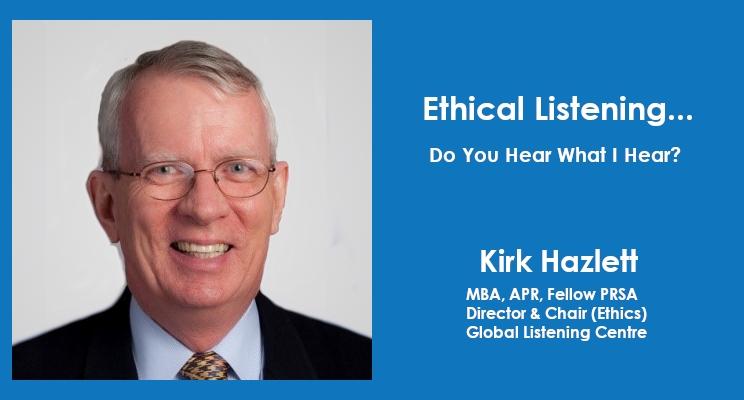
Ethical Listening…Do You Hear What I Hear?
In my current (nearly two decades now!) role as a Communication professor, I emphasize to my students—especially those enrolled in my Public Relations courses—the critical importance of listening to those who have an interest in your organization’s activities and ensuring that their concerns are addressed appropriately.
British philosopher George Edward Moore said it so clearly more than 100 years ago in the preface to his renowned book, Principia Ethica [1903]: “It appears to me that in Ethics, as in all other philosophical studies, the difficulties and disagreements, of which history is full, are mainly due to a very simple cause: namely to the attempt to answer questions, without first discovering precisely what question it is which you desire to answer.”
So many of our world’s dilemmas today are the direct result of individuals and countries hearing and acting without listening and understanding. More and more, our leaders seem to be programmed to act immediately without first taking the time to fully comprehend the intent behind the original communication. And, sadly, this all too often leads to what I so often describe as the “Ready…Fire…Aim.” syndrome that is the prelude to armed confrontations and global unrest.
It is our responsibility as reasonably civilized occupants of this planet to embrace the concept of “civil discourse” and engage in constructive dialogue that will lead to understanding and agreement rather than petulant posturing. And it is organizations such as the Global Listening Centre that are ideally positioned to lead the way by calling attention to and demonstrating the effectiveness of active, participatory listening rather than simple hearing.
“Ethics,” as I have advised my former employers and clients, and now my students, for years, is best defined as “doing the right thing for the right reasons.” And “ethical listening” can best be described as the “conscious act of fully comprehending another party’s communication.” It is an active process that requires active participation by both parties. Sadly (again), we are treated on a daily basis to glaring examples by so many representatives of so many different governments of just the opposite. Their goal would appear to be full-on confrontation rather than cooperative conversation.
All is not lost, however, says this eternal optimist. The opportunity is there for all of us to actively encourage in our own interactions with others, whether it be in the classroom or in the boardroom, listening in the pursuit of understanding. But we can’t take a passive approach. We have to proactively demonstrate that our commitment is founded on our deeply-held conviction that listening is the first step in achieving harmony.
Many of my social media followers are well aware of my tendency to make reference to Kahlil Gibran’s “Almustafa: The Prophet” on numerous pertinent occasions. One particular quote applies here when it comes to ethical listening from Kahlil Gibran, “The Prophet” (1971) – Page 10:
People of Orphalese, of what can I speak save of that which is even now moving within your souls?
Asking the question…then listening to the answer…is the key components to ethical listening.
